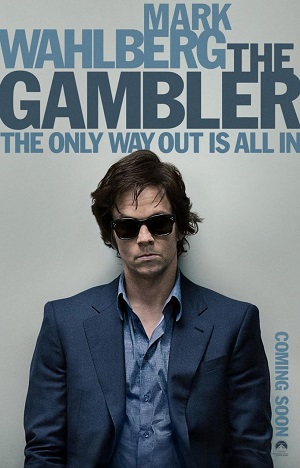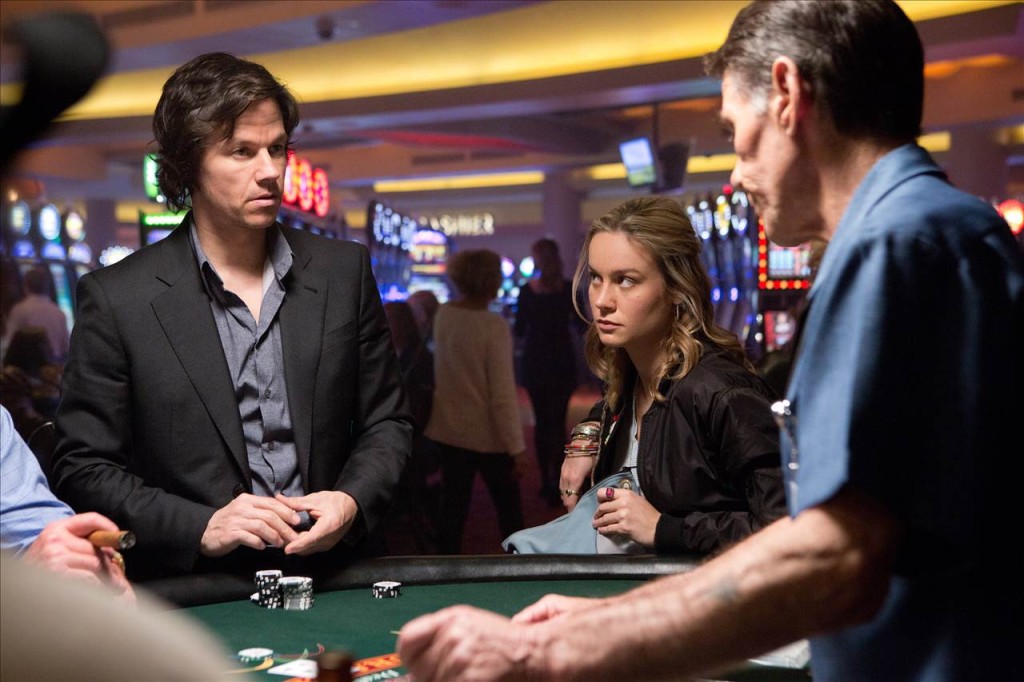“The Gambler,” a remake of a 1970’s James Caan picture of the same name, is an entertaining couple of hours spent with a self-hating asshole who can’t help but “tell it like he sees it,” leaving himself prone to pissing off everyone he comes in contact with because he either doesn’t understand the basic rules of society and human interaction or he does understand and just doesn’t care. Actually, since he’s an asshole, it’s definitely the second one.
“The Gambler” is about The Gambler (Mark Wahlberg), and we are introduced to the guy crying at this dying grandfather’s bedside. Quick funeral, opening credits, then boom, The Gambler arrives at some shady, backroom gambling speakeasy with a good chunk of cash money and he starts a-gamblin’. But he has his style of gambling, which seems to be that he always goes all-in, double or nothing, hit a home run or strike out, and I have to admit, this is an exciting way to gamble. Making $10,000 into $20,000 in a matter of seconds and then immediately trying to push that to $40,000 must be a hell of a rush. Which then must make it a huge bummer when you inevitably lose and that huge sum of money disappears in one fell swoop. The Gambler doesn’t even bother taking one small marker for himself from the growing pile of winnings, he just keeps doubling down until he gets what he wants or he’s done for. And almost every single time, he does not get what he wants.
What does he want? What number is he aiming for? Well apparently he is trying to gamble his way out of a gambling debt, and right away we all know where this is going. He owes the gambling house (i.e. the South Korean mob guy who owns the place) a substantial amount, and he’s borrowing from them to gamble, just to lose that money, increasing his debt. Then he gets staked by another gangster (Michael K. Williams) and he loses that money right away and now he’s in debt to two bad ass dudes. So what does he do? He goes to another underground criminal type (John Goodman) for some possible debt consolidation. But oh boy does that not work out.
So The Gambler keeps gambling and he keeps losing and the weird thing is that there are times when he doesn’t seem to care that much. Sure there are other times when he stops to think about his situation and he seems stressed, but often when someone actually confronts him with his problem, he clams up and acts tough and pretends that it doesn’t really matter. And when the different mobsters confront him about the debts, he never lies to them and tells them what he’s trying to do and how he doesn’t have the money so he understands their position and so on and so forth, and his matter of fact attitude drives these guys a little crazy, which leads to more than one beating for The Gambler.
Oh yeah and the whole time he’s an associate professor at a local college who is popular because he is a published author of a novel that is well liked by everyone except himself. There is a long scene early on, shortly after he loses a ton of money, in which he gives a lecture for his Lit 101 course that is less lecture and more him just ranting and raving about a handful of the students in his class and how only geniuses should strive for their goals and everyone else should just settle into their mediocre lives as electricians and gas station attendants and whatnot. And don’t worry, in case you don’t get that he’s talking about an “all-in” mentality to living that reflects his gambling style, one of his students brings this up to him explicitly so that we can then get it fully. This scene is a little ridiculous because it feels false, like this kind of rant never really happens in college campuses. This is the kind of classroom scene that only happens in movies. And also, I really didn’t buy Mark Wahlberg acting like an intellectual like he does here. It just doesn’t fit. He’s doing his best, and really he’s not bad, but there were a few moments when it felt like he was talking about the honeybees in “The Happening” all over again.
But still, he’s pretty much good in this whole thing, especially when he has to do his numerous stand offs and face to face meetings with the heavies in this movie, though his best scenes are probably with Jessica Lange, who kills it as The Gambler’s rich mother who just feels like she can’t help her son anymore. Conversely, while Brie Larson is good as she usually is as the student/possible love interest of The Gambler, there relationship never feels very vital to the movie, as The Gambler really doesn’t let anyone in, even when he does. So when this movie has a climax centered on their relationship, it feels a little lacking in punch because instead of really letting that relationship grow and change over the movie, we spent way more time watching The Gambler get beat up and try to hustle more money to do some more gambling.
So the movie is good though not great. Like a DVD night kind of movie. I enjoyed “The Gambler” enough, but I can also already feel it slipping away from my memory, just another footnote in the history book of cinema.



 Bonus Episode – 2018 Year Preview
Bonus Episode – 2018 Year Preview #540 – The Initiation Game
#540 – The Initiation Game Netflix pick for 9/21/15 – ‘The Babadook’
Netflix pick for 9/21/15 – ‘The Babadook’ Review: ‘Entourage’
Review: ‘Entourage’
Leave a Reply
You must be logged in to post a comment.